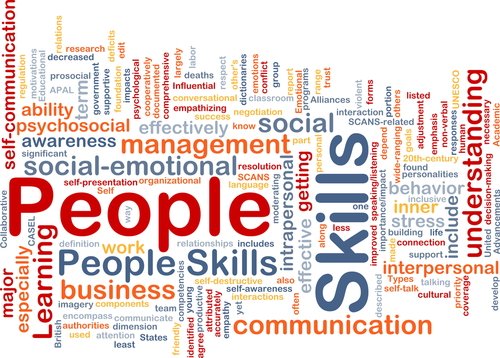In most organizations, continuous learning and self-improvement isn’t a formal requirement, but it’s one of the top unwritten ones. Wherever you are in your company, taking charge of your own development is always a good idea.
And the nice thing is, you don’t need an embossed invitation to a leadership training to prepare you for the next level. Here are six skills everyone can (and should) work to improve, regardless of where you’re at in your career.
1 : Mindfulness
Mindfulness is the ability to notice your emotional response to events, without reacting to them. In stressful or high stakes situations, mindful people are able to pause for a beat and look at a what’s happening impartially. You can begin today by taking an extra breath and trying to examine events from an objective point of view.
2 : Collaborating Across Differences
Being a team player has always been important, but learning the skill of collaborating across differences in our increasingly diverse world is a timeless necessity. You should strive to be someone on your staff who celebrates the full spectrum of uniqueness and difference in everyone.
Organizations and teams that can collaborate and work effectively across differences like gender, race, religion, politics, and age will be the ones at the front of the pack. The first step to develop this skill is to become more aware of your unconscious biases about people who are different than you.
3 : Resilience
Some people take feedback—and even failure—better than others. The ones who don’t let hard news slow them down are resilient.
Setbacks are a part of life. It’s how you choose to respond to them that matters. The strongest people neither avoid feelings of failure, defeat, and rejection nor do they become paralyzed by them. When unexpected obstacles get in the way, they grieve, dust themselves off, and jump back in.
4 : Working at Your Highest and Best Use
Pretty much everyone’s work involves tasks ranging from simple, repetitive ones that happen every day to complex ones that take months or years to complete. Focusing on the most complex, long-term tasks on your plate is the sweet spot where you produce the most value. However, you can’t solely do the long-term tasks at the expense of short-term job requirements.
You have to be able to do the easy daily to-dos while staying focused on the “bang for the buck” items where you add the most value. Balancing highest and best use with daily chores is an occupational hazard for managers who work on big, multi-year projects with budgets in the hundreds of millions (as well as the rest of us who are balancing work on something due at close of business, versus the end of the quarter).
The most important thing you can do is not get lost in either one: Don’t neglect your inbox altogether, or alternatively, be so consumed by answering emails that you never find a chunk of time to focus on the big picture project. Find the way that you work best and can find time for both.
5 : Empathy
Anyone who works to improve his or her ability to be empathetic will stand out at work, with the bonus of a happier home life. As you know, empathy is the ability to put yourself in someone else’s shoes and see how it might feel to be him.
Working on your emotional intelligence results in the people around you feeling seen and heard, and it’s is a key ingredient in developing trust with co-workers. Your co-workers don’t want your sympathy. Telling someone “I’m sorry you feel that way” usually just makes him or her more angry, but saying (and meaning), “I’ve been frustrated when something doesn’t work as planned, and I understand why you’re angry. Let me help…” almost always works.
6 : Inquiry
Inquiry, or “learn how,” is replacing expertise and “know-how,” in business today. The world’s hardest problems are going to be solved by curious people who can find the right questions to unlock new discoveries.
Know-it-alls are a bore, but great question-askers help us grow, learn, and innovate. Brian Chesky and Joe Gebbia couldn’t afford to pay their rent, and they wondered how they might use additional space in their apartment to lodge tourists and make some money. Finding the answer resulted in the founding of Airbnb.
Don’t be afraid to ask questions—at work, and of yourself and your career. It will help ensure that you’re always growing.
Hope these tips help you :)
Congratulations @doctorart! You have completed the following achievement on Steemit and have been rewarded with new badge(s) :
Click on the badge to view your Board of Honor.
If you no longer want to receive notifications, reply to this comment with the word
STOPHi! I am a robot. I just upvoted you! I found similar content that readers might be interested in:
https://www.themuse.com/advice/6-life-skills-you-better-pick-up-if-you-want-to-succeed-at-work